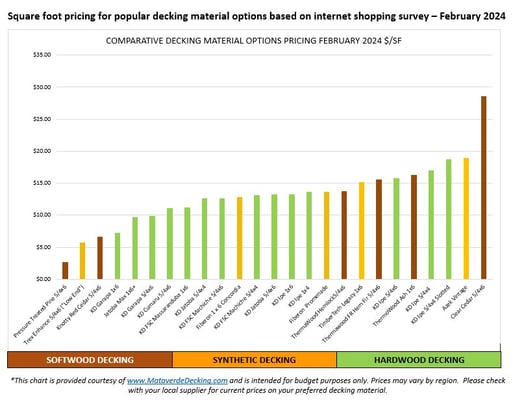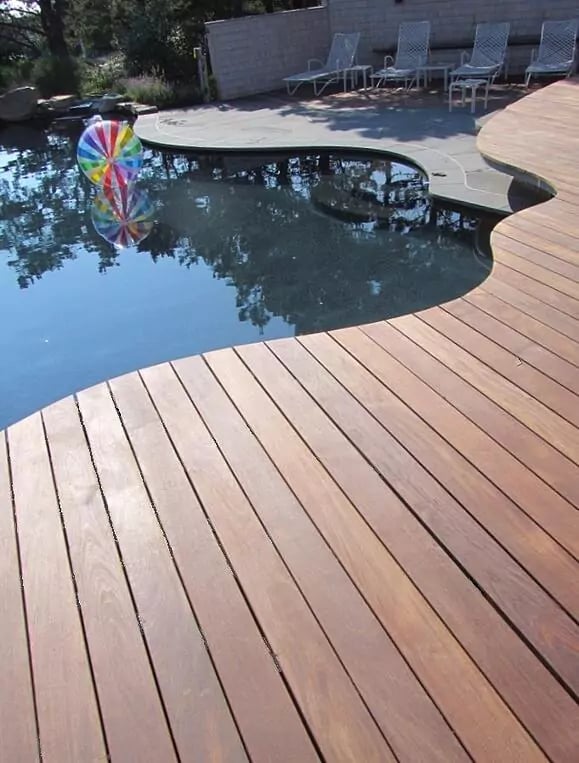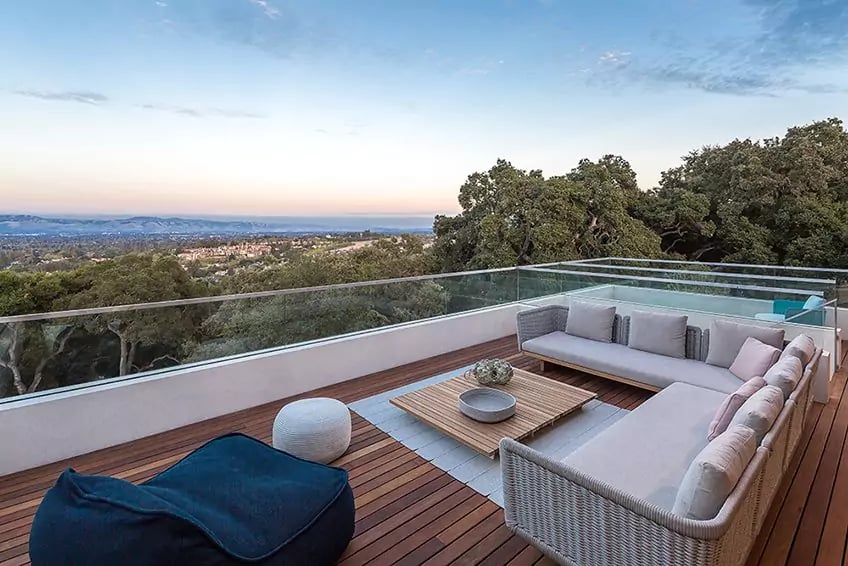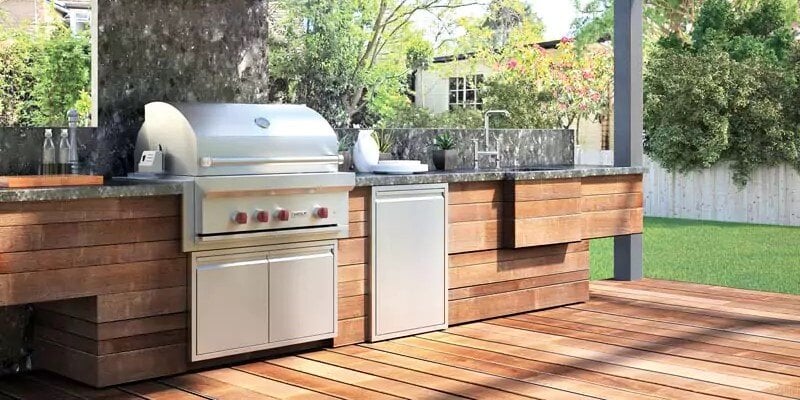
Below is a good example of composite decking breakage at the fastener, which can happen after high winds.

Synthetic (PVC) Decking
PVC decking has medium resistance to many weather troublemakers. It offers a consistent wood-look or painted color finish in many shades. However, its plastic-like look may not appeal to everyone. PVC decking also gets hot in sunlight.
Pros of Plastic Decking:
-
-
Available in many colors
-
Medium resistance to fading, and cracking
-
Low-maintenance, comes prefinished and does not need refinishing or staining
-
Lightweight
-
Cons of Plastic Decking:
-
-
Higher cost than most other decking options
-
Shows wear and tear like foot traffic and scratching
-
Scratches and damage require board replacement
-
Hot days can warp the boards
-
Deck boards sag in high heat
-
It lacks the natural look and feel of wood
-
It looks and feels like plastic underfoot
-
It can become very hot in direct sunlight
- Susceptible to cracking in freezing temperatures
-
Below is a customer's photo of their popular brand PVC decking after 5 years of New England weather exposure. You can easily see the warping and changes to the board shape.
.jpg?width=973&height=649&name=Popular%20composite%20plastic%20decking%20after%205%20years%20of%20sun%20and%20weather%20exposure%20(1).jpg)
High Density Hardwood versus Cedar and Redwood Decking
Light softwood options have a natural resistance against insects and can last many years, even weathered, making them good choices across varied climates. Western Red Cedar and redwood also have a natural look and feel that blends well with many landscapes.
So, how about damp or humid climates? Without the high fiber density of hardwoods, softwoods are much more susceptible to these threats, mold, and mildew, and require additional upkeep. Cedar must be refinished or repainted regularly to prevent rotting.
In areas where wet weather is common, these woods require frequent staining or sealing to keep moisture out. Snowy conditions will also require additional maintenance since they aren't heavily dense like tropical hardwoods. If you want your deck to gray, consider that weathered softwoods have increased maintenance needs and a can check and split more easily.

High density, tropical hardwoods are also less costly than similar grades of Redwood or Cedar decking, which will have much a higher upfront investment.
Pros of Cedar softwood decking:
-
-
Natural resistance to rot and insects
-
Beautiful, natural appearance
-
Relatively lightweight
-
Cons of Cedar softwood decking:
-
-
Expect high prices for the upper grades of cedar
-
Low fiber density gives it a lower resistance to rot, decay, mold and mildew
-
Requires regular maintenance to prevent decay
-
It may be prone to splintering and warping over time
-
Weathered Cedar and Redwood require additional maintenance
-
Looking for more information about comparing decking materials?
DOWNLOAD the "Ultimate Guide to Selecting the Right Decking" now.
Other Things to Keep in Mind When Designing A Deck
 An Ipe deck that has weathered to its' naturally satiny-silver patina
An Ipe deck that has weathered to its' naturally satiny-silver patina
The weather might be the main factor affecting your choice of decking materials, but there are still other things to keep in mind:
Always Safety First
Remember that some decking can get hotter under direct UV? The hotter certain materials get under the sun, the more dangerous they become for bare feet. While you might think it’s ok to brave the burn, kids and pets might not be as prepared for scorched feet.
If you live somewhere that receives intense sunlight throughout most of the year, keep this in mind when comparing wood decking to composite and synthetic materials.
Hardwoods are also a safe choice since they have incredibly high bending strength and are excellent when designing decks with high-weight items like hot tubs, benches, furniture, or planters.
Mind the Upkeep
It's true; some materials require more attention than others. You may be okay with a practice of staining or sealing when needed if you have a natural wood aesthetic in mind. Or you may want to weather your deck to natural gray. Hardwoods are perfect for these options.
Do composite and synthetics win points for needing little more than a regular cleaning?
Yes and no.
While wood-look options can save time with refinishing, they could easily require more annual repairs. This includes storm damage and impact from flying debris in high winds.
Composites and synthetics can last many years, but will show wear and tear, chips, cracks and damage much sooner than hardwoods and may “ugly out” before it wears out and needs replacement.
Functionality Matters
Surely, your deck must boast good looks to impress neighbors and guests alike, but don't forget what functionality gets you: a long-lasting gathering spot for everybody. You should also consider how much foot traffic your deck will have before making the call on materials.
Cost Considerations
Building a deck is an investment. Everyone has a budget to meet, and the cost of building a deck will certainly affect what kind of decking material you end up choosing. While some materials may have a lower initial cost, they may require more frequent maintenance over the years. This adds up to potential costs in the long run.
Options like tropical hardwoods are comparable in price to many composites and synthetic decking but will save you from spending additional money on maintenance and repairs year-over-year and offer a longer, more sustainable, lifespan. You're investing in many fruitful years of use, after all.
Would you like to see if hardwood decking meets your project budget needs?
Request a quote today. We're happy to help.
Climate-Specific Traits
It's not just about “what works” but also “what works best” for your specific climate requirements. Here are some recommendations for common climates:
Hot and Dry Climates
For those in desert-like climates such as Arizona or Southern California, a hardwood can endure prolonged UV exposure without warping or fading, while composite materials are less resistant to intense heat.
To fully enjoy the time spent on your deck, FSC Machiche wood, shown below, gives you rich color and stays beautiful in hot, dry weather. Minimum maintenance lets you spend more time on the deck relaxing.

Hot and Humid Climates
In moisture-rich environments like Florida or Louisiana, beating the heat and humidity are key. Tropical hardwoods stand strong against swampy air because they're less prone to water absorption, and less water means fewer chances for mold and mildew to creep in. They also hold well against insects and rot, making them quite a good addition.
A Garapa wood deck on a beach house rooftop, below mid-installation, on the island of Jupiter, Florida. The high moisture content, strong UV, insects, and harsh storms in the region are significant considerations when selecting wood decking material. Garapa had the look of teak at a more cost effective price and very high damage resistance against all of these factors. It was used for the rainscreen wood siding, too.
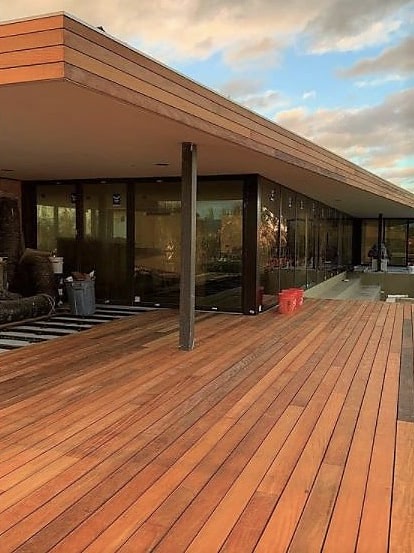
Cold Climates
If you're calling places like Minnesota or Idaho home, where the thermometer reading sometimes disappears into deep negatives, hardwood is ideal, too. The high fiber density of hardwood lets it withstand extreme temperature fluctuations without bending, splitting or warping.
Consider the second floor deck below, used in all seasons with the hot tub. To take advantage of a hot tub or outdoor fireplace in any weather your decking should be up to the job. Hardwood can handle heavy snow and ice without splitting or checking.

Coastal Areas
When living by the coast, in places like Cape Cod or Malibu, you've got to deal with salt air and sea spray. Again, tropical hardwoods can save the day with their impressive resistance not just to moisture damage but also to salt damage. Always use stainless steel fasteners in salt water environments.
Ipe hardwood was selected for this Malibu rooftop deck, below on a beachside event center, with high UV and salt air in mind.

For the Love of Your Deck
Maybe the deck is more an idea than an actual structure at this point. Or maybe you're looking to replace an old deck that's clearly had better days. Either way, remember that where your deck stands, weather-wise and use-wise, matters most when choosing the perfect material.
With a lifespan of decades, the right deck not only adds a visual appeal to your home but can also serve as the backdrop for countless memories. Take your time in making this decision, do your research, and pick the material that not only complements your landscape but also thrives in your particular climate conditions.
Related Posts
